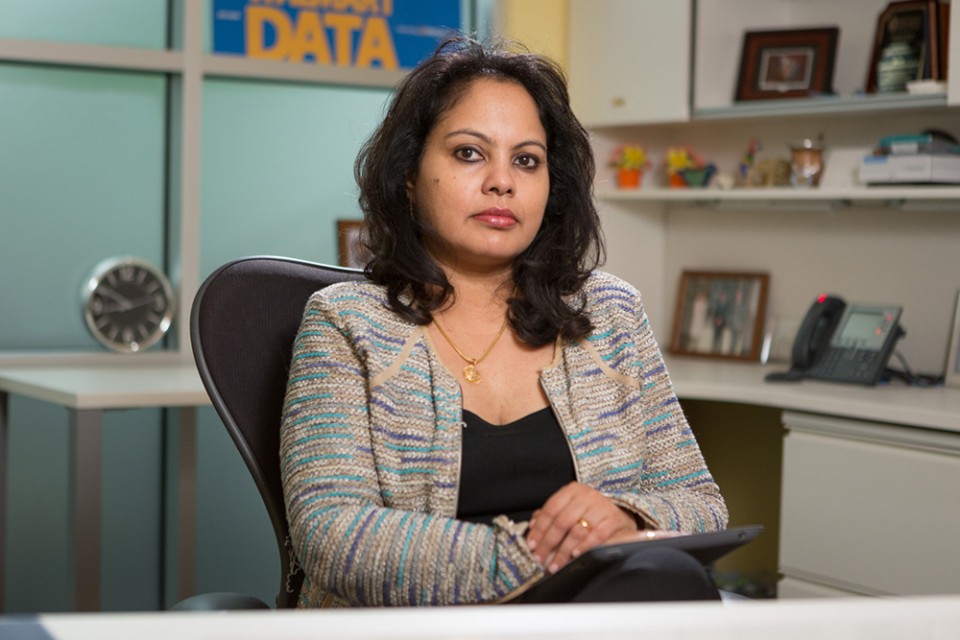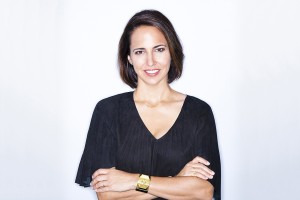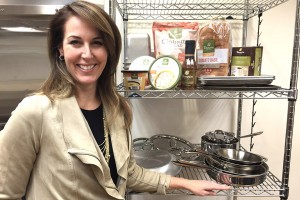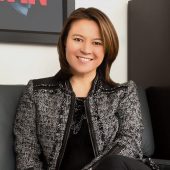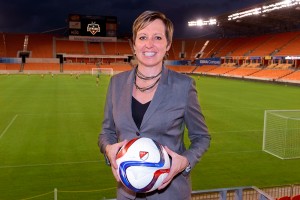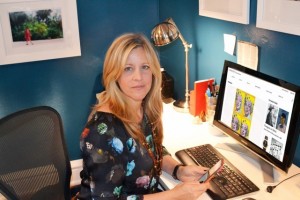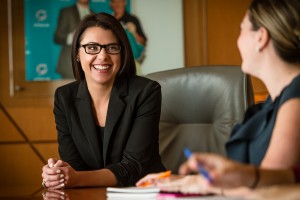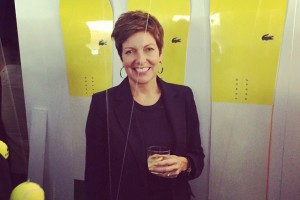Suja Chandrasekaran, SVP & Chief Technology Officer at Walmart, London Business School Attendee, and Ardent Globetrotter
There are some writers whose first language is not English, yet the prose they produce in the latter has both astonishing finesse and clarity – sometimes much more than that of the average native English speaker. (Joseph Conrad, the Pole who wrote Heart of Darkness in English, later adapted into the film Apocalypse Now, is one such example.) And while she is not a famous novelist, it can be said that Suja Chandrasekaran, originally from India, is another. She has reached the C-Suite level at Walmart, the world’s largest company by revenue, and is their Senior Vice President and Chief Technology Officer. She also shows however that she is not simply a “techie,” but rather can create very graceful English prose better than many born-in-America folks.
She graduated from University of Madras in India with a Bachelor in Electrical and Electronics Engineering, received her Master of Business Systems from Monash University in Melbourne and Executive Development education at the London Business School, and has worked in Australia and Latin America. She speaks articulately about “managing energy” rather than time; confronting any fear of change head-on; and about how her background has influenced her work. She is also an admirer of Steve Jobs, and makes a fascinating comment about integrity – that hard-to-define-but-I-know-it-when-I-see-it mix of excellent work ethic + good moral code + a focus on what helps the greater good of the company. Her practical recommendations: egg whites for breakfast, and the book The Confidence Code. Read on for more about this intelligent, eloquent C-Suiter below.
Can you tell the readers a little bit about yourself?
I have always had a passion for technology and also for developing others. It’s that passion that has guided me to my role today as a tech-industry leader. Outside of work, I am equally passionate about my marriage, my two children, and globetrotting!
What does a day in your shoes typically look like?
As a leader, a lot of what I do is about people – influencing and interacting with my customers, peers, and stake-holders, plus engaging with my direct reports and my larger teams, and connecting with external groups, vendors and business partners. Much of my work focuses around tech innovation, strategy, and ideas – then driving those ideas from concept to action to outcome to impact. So my day is filled with problem-solving moments.
On a more personal level, my roles as a mom, wife, daughter and sister are also part of my day. During the weekends, I still try to connect with industry peers, leaders, mentees and mentors. My days can be summed-up as a fluid continuum of both professional and personal focus and choices.
What is your breakfast of choice?
Egg whites, chai latte and plenty of water.
What are your rituals or tips for staying energized and motivated?
When you love what you do, motivation is rarely an issue. But beyond that, the biggest change in my personal productivity happened when I began managing my energy, instead of managing my time. This involves paying attention to the mental clarity I have at the moment. Clarity and conviction of thought is highly energizing – and conversely, lack of these things can drag down your energy. Putting in “think time” and being prepared are highly energizing.
I also draw energy from exercise, yoga breathing, and fruit sugars. And, did I mention caffeine?
What is the favorite part of your job?
It lies in impacting people’s lives and careers. Whether it’s getting a capability that delights our customers who buy our products, solving a problem for our end-users, or helping associates develop in their abilities and careers, that impact is the most rewarding part of what I do.
What and who inspires you at work?
I am inspired by so many people and things. Just being part of the technology eco-system that has evolved beyond words – i.e. that has influenced how we travel, consume media, do our banking, watch our health, buy our products, how we manage our energy consumption and how most of us have “turned global” — as though it is the most natural thing to do.
Even with all this impact, there are still so many more possibilities to improve lives, and so much more to be done. As Steve Jobs said, “Technology is about the humanity it touches, not just the machines.” Technology has a phenomenal impact, and still there is a long way to go. Technology, with its impact and its possibilities – that’s what excites and energizes me.
Also, many people have inspired me throughout my career. My mentors, sponsors, my associates, and others – all have been brutally honest in giving me feedback. Inspiration is not something that is “one and done.” Being open-minded means being open to inspiration every day. With all the possibilities, it’s about being energized every day to a new intensity.
What is your favorite leisure activity after a stressful work week?
Reading, exercise and device-time. I also love to travel globally, and have made that part of my annual plan.
How does your culture/background influence your work?
I was born in India, have lived in Australia and the United States, and have worked in Latin America and Europe. In a way, I have become a mash-up of all these cultures, adapting and absorbing components of each. At the core of it, my culture is embodied by a fire in the belly that comes from being raised in an emerging economy with access to limited resources, with highly ambitious parents, and a rich spiritual culture. It is that culture that has taught me to balance just the right dose of assertion without bordering into arrogance, and with a lot of observable, palpable humility. A very high tenacity, trust to get the job done – that comes from my upbringing.
How many times have you changed your career direction?
I’ve had a few major changes with many smaller ones. I’ve always had a passion for enabling customers through technology – i.e. differentiating and disrupting with technology. So I have performed in roles that have taken me across business models, business process, coding, data and analytics, digital, and technology infrastructure.
I have even done this across various geographies: at one point in my career, Nestlé asked me to take a role covering all of the Americas in Sao Paulo, Brazil. While I had traveled to Latin America, I had not lived or worked in Brazil. I was afraid of the unknown, but my time in Sao Paulo is one of the most memorable in my life: I grew as a person, and learned so much about the people and the culture (such wonderful people – I miss all the hugs and kisses!). I also learned about transforming business processes in Latin America, how best to apply technologies, and how it is different from applying technology in the U.S. or Europe. That was an awesome time.
So I have never been afraid of seeking challenging opportunities. Making an impact through technology is a calling for me, and the tougher the job, the more exciting the call! Fear of a change – that knot in the pit of your stomach – it’s in those moments of discomfort that I believe we grow. Life is a series of experiences, and the wider the variety, the richer each experience becomes.
What has been the biggest obstacle in your career, and how did you overcome it?
I was my own biggest obstacle. I realized that my paradigms were boxing me in, and I had to break away from them. And then there were basic things like thinking in my language and translating to English; I had to consciously transition to think in English.
And within my career, when I was an individual contributor, I realize that all I thought of was my code, the servers I built, the databases I enabled, and my internal customers and peers. I had to begin to think more broadly — thinking of my team, people development and cross-functional engagement, and that took me to middle-management. Then it shifted to thinking of my company, its eco-system, and the community impact, which enabled me to reach C-suite level.
And now, working for Walmart gives me the courage to think about “making a dent in the universe.” It is empowering to amplify your thinking. The key is to address your paradigms. You are never too young to play the biggest role, and no matter what role you play, you are the CEO of that job.
How have mentors impacted your personal and professional development?
They’ve given me brutally honest feedback and have been great sounding-boards. By believing in me and my ability to make an impact, connecting me with their networks, and pointing me in the right direction, they’ve helped me weed out the responsible feedback from useless noise to act upon the right information. They have given me tips and techniques, and shared their own experiences and stories when I have been down.
I remember vividly when I one of my mentors shared this sentence: “Suja, if I had dropped a penny every time I was humiliated in a meeting, I would be quite rich.” This came from a very senior executive, and by sharing her vulnerabilities and experiences, she helped me see that everyone goes through difficult circumstances. But the leadership comes out in how we respond in those circumstances. This support system has been quintessential in my personal development and is also why I double-down and pay it forward with my mentees.
What are three questions you like to ask during an interview to know if the candidate (or job) is the right fit?
It’s not necessarily any specific question. I look for passion, energy, competency, integrity, and a willingness to learn. Passion and energy can be sensed through various questions on background and career progression, and during the conversation I also look for openness to learning, developing and changing.
Integrity is tougher to assess, and is absolutely a deal-breaker if it comes across as an issue. It requires looking broader than that one-hour chat, so I also rely on my network to gather insights and responsible thoughts on a potential hire.
What advice would you give to women starting their careers?
-
-
- Start early, and spend intentional time on “leadership.” You don’t need a title to be a leader; being a leader is a journey you will observe, exhibit, improve and practice throughout your life.
- Build unequivocal competency and brilliance in a subject matter. Whatever your passion, make learning part of your professional and personal ethos.
- Have a game plan – a big game plan – and continuously review it. Always lean towards action and outcome, because big energy and big action result in big impact.
- Always give back by developing others. Everyone needs a hand, and you are never too small to develop others. When you are ready to hang your hat, who you have helped is what will stay in your heart. Leave a legacy.
- Take risks, take chances, be bold and go for it! Ships pegged in safe harbors don’t make much of a sail.
-
What book would you recommend for women just starting their career?
The Confidence Code by Katty Kay and Clare Shipman is a must-read. They have amazing insights that every woman can relate to and take action on.
What is your favorite quote you try and live by?
When I mentor others, one quote I often like to reference is: “Plan the macro; execute the micro.” I like that it speaks to both the broader game plan and also the specifics. So always walk towards your “true north,” while also knowing and anticipating the hills, ravines, ponds, thorns, and scenic routes along the way.
TAGS: SharpSavvySignificant
 Interviewer Interview Prep
Interviewer Interview Prep Impactful Mentees
Impactful Mentees Benefits of a Mentor
Benefits of a Mentor Advice for First-Time Managers
Advice for First-Time Managers Overcoming the 18-month Itch
Overcoming the 18-month Itch Dressing for Your Style
Dressing for Your Style Interview Style Tips
Interview Style Tips Women's Stocking Stuffers
Women's Stocking Stuffers Gift the Busy Traveler
Gift the Busy Traveler Father’s Day Gift Guide
Father’s Day Gift Guide Airport Layover Activities
Airport Layover Activities Traveling & Eating Healthy
Traveling & Eating Healthy Travel Like a Boss Lady
Travel Like a Boss Lady The Dual California Life
The Dual California Life Gifts for Thanksgiving
Gifts for Thanksgiving Summer Reading List
Summer Reading List Top Leisurely Reads
Top Leisurely Reads New Year, New Books
New Year, New Books Life Lessons from a Sitcom
Life Lessons from a Sitcom Oprah, Amy or Amal?
Oprah, Amy or Amal?





